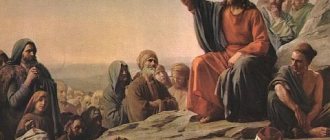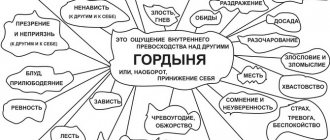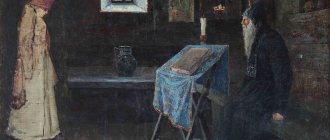Optina elders and their sayings
The lamps of the Orthodox faith, the unshakable pillars of monasticism, the consolation of the Russian land, the venerable elders of Optinstia, who have acquired the love of Christ and laid down their souls for their children...
On October 11/24, the Council of the Reverend Fathers and Elders, who shone forth in Optina Pustyn, is celebrated.
Cathedral of the Venerable Optina Elders
The Holy Fathers said: “It is better to live with a confessor in a market square than to live alone in the desert.” And again: “Spiritual orphanhood is worse than carnal orphanhood.” The Monk Macarius wrote: “Achieving salvation precisely consists in acquiring a leader and cutting off one’s will and reason.”
Sometimes they say that it is enough for the laity to simply live according to the commandments. Yes, the commandment was given to us, but in life it can be fulfilled in different circumstances in different ways. And it is not always easy to understand what is happening: whether it is a temptation or what the Lord wants from you.
Spiritual life does not mean only being in the clouds, it consists in revealing the laws of spiritual life, as far as they apply to a given person in his situation, in his conditions. And the Optina elders revealed these spiritual laws to worldly people, helped them understand and comprehend life’s circumstances, and instructed them on the path to salvation.
All Optina elders were spiritual leaders of the laity. Spiritual guidance and nourishment took place personally and through correspondence, through instructions. The Monk Joseph wrote: “I believe that everyone who comes to Optina Pustyn in their extreme need will find satisfaction by the Grace of God... for the prayers of our great fathers.”
The venerable elders of Optina cared for all of Russia for more than a century and continue to instruct us, their descendants, continue to pray for us. Let us embrace their instructions and teachings as if they were living and healing water.
***
Hieroschemamonk Leo (Nagolkin) (1768-1841)
Venerable Leo:
- Above all, beware of looking down on and judging your neighbors - we have something to worry about: our own sinful wounds stink, we need to be diligent about them. You will not give an answer for others, but for yourself.
- Whoever feels his affairs according to Bose, it’s not bad here, and it’s good there.
- Doing the commandments of the Lord gives life to the soul and even your body will pacify and comfort you to the point of abundance.
Reverend Moses:
- If you ever show mercy to anyone, you will receive mercy for that.
Schema-abbot Anthony (Putilov) (1795-1865)
Venerable Anthony:
- The Pharisee prayed and fasted more than we do, but without humility all his work was nothing, and therefore be most jealous of the publican’s humility, which is usually born from obedience and is sufficient for you.
- Moreover, it was noted by the holy fathers that when a person prepares to receive the Holy Mysteries or expects to celebrate some holiday, the devil tries with all his might to annoy the person and thereby confuse his soul, so that that day would be spent not in joy in the Lord, but in demonic sorrow . The reasons for his attack on us are different, but the most important one is the condemnation of our neighbors, which sin, and in addition to fornication and other temptations, defiles not just the body, but also our very soul.
- Peace of mind is acquired from complete devotion to the will of God, without which nothing would happen to us. And if your husband really was not good, then ask yourself in conscience before God: “Am I, a sinner, worthy of a good and kind husband?” And your conscience will certainly say that you are absolutely not worth anything good, and then in humility of heart, with submission to the will of God, you will love him from your heart and find a lot of good things that you have not seen before.
Hieroschemamonk Macarius (Ivanov) (1788-1860)
Venerable Macarius:
- One passion reproaches another: where there is self-love, there the love of money gives way, and vice versa happens. And we know that all vices sometimes leave a person, but one remains with him - pride, which is content to replace the others.
- But we should not dare to accuse someone who insults us, even if the insult may seem wrong, but consider him an instrument of God’s Providence, sent to show us our dispensation.
- And no one can offend us or annoy us, unless the Lord allows this to be for our benefit, or for punishment, or for testing and correction.
Venerable Hilarion:
- If you pacify your own heart towards someone who is angry with you, then the Lord will tell his heart to be reconciled with you.
- Every task must begin by invoking the name of God for help.
Hieroschemamonk Ambrose (Grenkov) (1812-1891)
Venerable Ambrose:
- If you want to have love, then do things of love, even without love at first.
- We must live on earth the way a wheel turns: only one point touches the ground, and the rest constantly strives upward; And as soon as we lie down on the ground, we can’t get up.
- Living simpler is best. Don't break your head. Pray to God. The Lord will arrange everything, just live easier. Don't torture yourself thinking about how and what to do. Let it be - as it happens: this is living easier.
- The asked cross is difficult to bear, but it is better to simply surrender to the will of God.
- Anyone who has a bad heart should not despair, because with God's help a person can correct his heart. You just need to carefully monitor yourself and not miss the opportunity to be useful to your neighbors, often open up to the elder and give alms within your power. This, of course, cannot be done suddenly, but the Lord is patient. He only ends a person’s life when he sees him ready for the transition to eternity or when he sees no hope for his correction.
- Before the judgment of God, it is not the characters that matter, but the direction of the will. Know that characters matter only in human judgment and therefore are either praised or blamed; but at the judgment of God, characters, as natural properties, are neither approved nor condemned. The Lord looks at good intentions and compulsion to do good and values resistance to passions, even if a person is sometimes overcome by weakness. And again, there is only One who judges negligence in this regard, knowing the secret heart and conscience of a person, and his natural power for good, and the circumstances surrounding him.
Hieroschemamonk Joseph (Litovkin) (1837-1911)
Rev. Joseph:
- If you see a mistake in your neighbor that you would like to correct, if it disturbs your peace of mind and irritates you, then you also sin and, therefore, you will not correct the mistake with an error - it is corrected with meekness.
- And it is useful for us when we are pushed. The tree that is swayed more by the wind is strengthened by its roots, but the tree that is in silence immediately falls.
- How circumstances have worked out is how we should live, because the circumstances around us are arranged not just by chance, as many of our modern, new-fangled wise men think, but everything is done to us by the Providence of God, constantly caring for our spiritual salvation.
- We ourselves increase our sorrows when we begin to grumble.
- Have what you need and need, but don’t collect what is superfluous, and if you don’t have and you grieve, then what’s the point? - Better stay in the middle.
- What works most powerfully in a person is contradiction. At will, a person will sometimes do something difficult, but if you tell him something easy to do, he will immediately become upset. And we must obey.
- Just as one should not seek honor, so those living in society should not renounce it for the benefit of others. The honor imposed is also from God.
- To everyone, that act of his neighbor seems great, which exposes him to something.
Hieroschemamonk Anatoly (Zertsalov) (1824-1894)
Rev. Anatoly (Zertsalov):
- Let us humble ourselves, and the Lord will cover us, and we will be holy. Until we humble ourselves and appease God, even if we break our foreheads on the floor with bows, our passions will not subside.
- Be patient with everything - you will be peaceful yourself, and you will bring peace to others! And if you start to reckon with it, you will lose the world, and with it, salvation.
- I’m telling you a secret, I’m telling you the best way to find humility. This is what it is: endure any pain that pricks a proud heart.
- Without winter there would be no spring, without spring there would be no summer. So it is in spiritual life: a little consolation, and then a little sorrow - and so little by little the path of salvation is formed.
- Let us accept everything from the hand of God. If it consoles us, we will thank you. And if it doesn’t console us, let us thank you.
- Learn to be meek and silent, and you will be loved by everyone. And open feelings are like opening gates: both the dog and the cat run there... and they shit.
- We are obliged to love everyone, but we do not dare demand that they love us.
Schema-Archimandrite Barsanuphius (Plikhankov) (1845-1913)
Venerable Barsanuphius:
- A sure sign of the death of the soul is avoidance of church services. A person who grows cold towards God first of all begins to avoid going to church, first tries to come to the service later, and then completely stops visiting the temple of God.
- The Lord puts each soul in such a position, surrounds it with such an environment that is most conducive to its prosperity.
- Our whole life is the great mystery of God. All circumstances of life, no matter how insignificant they may seem, are of great importance. We will fully understand the meaning of real life in the next century. How carefully we need to treat it, but we turn over our life, like a book, sheet by sheet, without realizing what is written there. There are no accidents in life, everything happens according to the will of the Creator.
- We must remember that the Lord loves everyone and cares about everyone, but if, humanly speaking, it is dangerous to give a beggar a million so as not to ruin him, and 100 rubles can more easily put him on his feet, then all the more the Omniscient Lord knows better who gets what for good.
- The most difficult thing is prayer. Every virtue from practice turns into a habit, and in prayer you need compulsion until death. Our old man resists it, and the enemy especially rises up against the one who prays.
- I hear complaints that we are now going through difficult times, that complete freedom has now been given to all heretical and godless teachings, that the Church is being attacked from all sides by enemies and it is becoming scary for it, that these muddy waves of unbelief and heresies will overcome it. I always answer: “Don't worry! Don't be afraid for the Church! She will not perish: the gates of hell will not prevail against her until the Last Judgment. Don’t be afraid for her, but you need to be afraid for yourself, and it’s true that our time is very difficult. From what? Yes, because now it is especially easy to fall away from Christ, and then it will be destruction.”
Hieroschemamonk Anatoly (Potapov) (1855-1922)
Rev. Anatoly (Potapov):
- They say the temple is boring. Boring because they don't understand the service! Services need to be learned! Boring because they don't care about him. So he seems not one of us, but a stranger. At least they brought flowers or greenery for decoration, if they took part in the efforts of decorating the temple - it wouldn’t be boring.
- Live simply, according to your conscience, always remember that the Lord sees, and don’t pay attention to the rest!
Venerable Nektarios:
- The main thing is to beware of judgment from loved ones. Whenever condemnation comes to mind, immediately pay attention: “Lord, grant me to see my sins and not condemn my brother.”
- You cannot demand from a fly that it do the work of a bee - each person must be given according to his standards. It can't be the same for everyone.
Hieromonk Nikon (Belyaev) (1888-1931)
Venerable Nikon:
- There has never been, is not and never will be a carefree place on earth. A sad place can only be in the heart when the Lord is in it.
- You should not seek human truth. Seek only God's truth.
- Always remember the law of spiritual life: if you are embarrassed by any shortcoming of another person and condemn him, later you will suffer the same fate and you will suffer from the same shortcoming.
- Do every task, no matter how insignificant it may seem to you, carefully, as if before the face of God. Remember that the Lord sees everything.
Our reverend fathers, the elders of Optina, pray to God for us!
Belief in God does not guarantee that a person's life will be filled with meaning
Ecclesiastes lived three thousand years ago. One would hope that science, education and technological progress have since changed things for the better. But here’s what the French existentialist writer Albert Camus stated in the mid-20th century: life is absurd, absurd by virtue of the fact that it always ends in death. And if the lack of meaning in life should not lead a person to suicide, it is only because he is left with the opportunity to rebel against this absurdity...
Camus could not see any meaning in life due to the fact that he adhered to a radically atheistic worldview. All attempts to involve God in explaining the absurdity of man’s relationship with the world seemed to him to be a scam, an evasion from the harsh truth of life. Other existentialist philosophers, such as the Dane Soren Kierkegaard and the German Karl Jaspers, on the contrary, brought religious faith into their thinking as the only way to give meaning to life. But this did not make their philosophy much more optimistic. Faith in God in itself does not free a person from the oppression of meaninglessness.
Atheism did not become popular until the end of the 18th century. The vast majority of people have always proceeded from the fact of the existence of God (or gods). But in the pre-Christian era, there was an idea that God blesses the righteous only in this earthly life, rewarding him with earthly goods and joys, family happiness and human respect. But with death a person loses everything. And from this point of view, everything that a person strived for during life turns out to be meaningless. In the grave, where you go, there is no work, no reflection, no knowledge, no wisdom (Eccl. 9:10).
Many modern people will agree with the conclusion that follows from this: thank God for what you have and don’t think about the future. Go, eat your bread with joy, and drink your wine with joy in your heart, when God is pleased with your deeds. May your garments be bright at all times, and may the oil on your head not fail. Enjoy life with the wife you love all the days of your vain life, and whom God has given you under the sun for all your vain days; because this is the portion of your life and of your labors, in which you labor under the sun (Eccl. 9:7–9).
Neither purely earthly, nor even religious answers to the question of the meaning of life “work” until the end, as long as the prospect of this life remains eternal death. A joyful and prosperous life with a family, a “house is a full cup,” good health and self-realization - all this is wonderful and blessed by God, but it acquires meaning only when multiplied by eternity, and not by death, which nullifies everything.
Thesis 4.
The meaning of a Christian’s life is to move towards God and unite with Him
Christians are convinced that the answer to the question about the meaning of life was given by the Lord Jesus Christ, the Son of God, who became a man two thousand years ago. He said: I am the way, and the truth, and the life (John 14 :6). He Himself is life, without connection with Him we turn into something like a laptop disconnected from the electrical network. It works for a while (if the battery is ok), but not for very long. And that means our task is to quickly, while the “battery charge” still remains, connect to the Source of true, undying, eternal life. In this, Christians find the meaning of earthly, temporary life.
The subject of the conversation might seem like a pure abstraction (how is it like to connect to the Source of life?!), but God Himself did everything to make this task feasible and practically feasible for us. At a certain point in human history He entered our world, being born as the man Jesus; He devoted his entire human life (full of difficulties and hardships) to caring for the people whom He treated, fed, taught, and resurrected. In the end, the top of Jewish society - the high priests and scribes - out of envy, sentenced Him to a terrible execution by crucifixion. But on the third day after death, Christ rose again and created, on the basis of the community of His disciples, the Church - a community of people faithful to Him, who, fulfilling His commandments and participating in the sacraments (in particular, tasting His Flesh and Blood in the sacrament of the Eucharist under the guise of bread and wine), turned out to be connected with Him by ties stronger and stronger than even the blood ties that ultimately unite us with Adam and Eve. Thanks to this connection with Christ, members of the Church - Christians - find themselves united with God Himself and that same eternal life, beautiful and blessed, is born in them.
Christ Himself expressed all this in a short and succinct phrase: I came so that they might have life and have it more abundantly (John 10:10).
This does not mean that Christians stopped getting sick, aging and dying, because, having become related to Christ, they did not cease to be distant descendants of Adam, which means, like all people, they inherited from him fallen human nature, gravitating towards destruction and death. However, for a person united with Christ, death is no longer the end of everything, but just a transition to Eternal life, birth to life with God. And the most interesting thing is that this heavenly life begins already here on earth. Righteousness and peace and joy in the Holy Spirit - what the Apostle Paul calls the hallmarks of the Kingdom of God (Rom. 14:17 ) - can be felt within oneself even in this life. And the miracles that are so often (perhaps sometimes even too much) told in the lives of the saints are nothing more than glimpses of that very Eternal life, life in abundance, in our meager reality.
Thesis 6.






